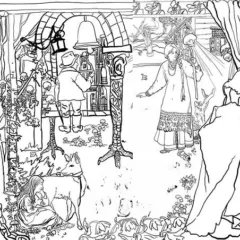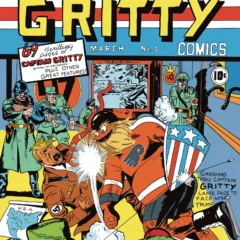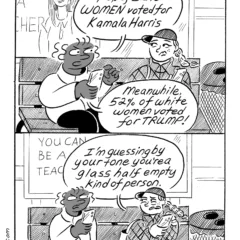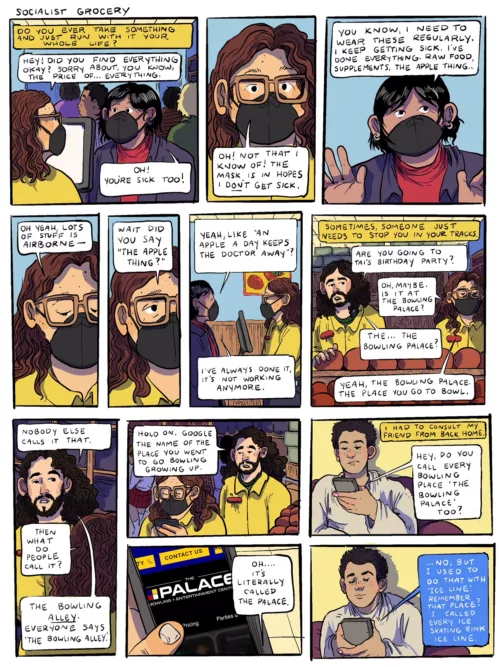Episode 280 – Roberta and Ryan discuss changes in the Philadelphia Art leadership as Zoe Ryan leaves as Director of the Institute of Contemporary Art at the University of Pennsylvania to become the director of the Hammer Museum. Roberta talks about Jeffrey Stockbridge and Eileen Neff. Ryan talks about the second Thursday openings at Box Spring and Commonweal. Ryan’s theater pick is Confabulation. We get into a grammatical conversation that takes us from High German to pizza in Rome and back. We hope you enjoy this episode.
Links for the show
Click to expand the podcast transcript
Roberta: Hi everyone, it’s Roberta.
Ryan: And this is Ryan, and this is the Midweek News
Roberta: On Artblog radio. Ryan. Hello.
Ryan: Hi, Roberta. How you doing?
Roberta: I’m doing okay. I’m hanging in as they say. I have a bit of a cold and if I do break down and start coughing, you’ll excuse me, please. I have four things to talk about in the news and they’re very brief. And then I have one sort of general thing to talk about at the end that is a grammatical thing that I thought you’d be interested in too if you hadn’t seen it in The Guardian.
So the first thing I want to talk about is the continual churn in the art leadership in Philadelphia, Zoe Ryan, who is ICA’s, Director (Institute of Contemporary Art) at the University of Pennsylvania has taken a position as director of the Hammer Museum in Los Angeles. So Bye-Bye, Zoe. She’s been at ICA for five years now, and I believe she came from the West coast. I believe she had experience out there, possibly. She’s from there. (Wrong! She was at the Art Institute of Chicago prior to landing at ICA!) ICA will be filling that director position sometime in the future, I’m sure.
Next are a couple of things that I noticed about artists getting their art used in commercial settings. Jeffrey Stockbridge, a photographer who’s known for his very empathetic photo project of Kensington opiate users, “Kensington Blues,” just did a photo spread for the New Yorker magazine, where he was invited to go to Western Pennsylvania and photograph steelworkers and former steelworkers for an article by a writer named Eyal Press, about change in the electorate. And it turns out a lot of the steel workers were Biden supporters. Biden is a huge union guy, you know, from Scranton. He walked the picket line (when UAW was on strike recently). He’s just a big union guy, and they’re not so sure about Kamala. Also, she’s been demonized so much. You know, she’s not their cup of tea. She’s not a guy. She’s not a guy’s guy, the way Biden was, “folks we’re going to do this” and “folks were going to do that”.
He was a real guy’s guy. Anyway, nice photos in the story in The New Yorker. And he’s had pieces of his photography used to illustrate New York Times stories in the past. So good for him.
Eileen Neff, another artist photographer who shows at Bridgette Mayer Gallery (Correction: Neff left the gallery last December), announced that she had her photo “Goat in a Field” — a darling shot of a white goat looking at you with a beautiful green field behind it — was selected as cover art for the musician Will Sass @willsass for his debut single “Alicia,” which is a synth, swoony piece with vocals. And it’s pretty. Congratulations to both Jeffrey and Eileen on getting their art out there crossing over, so to speak.
Next, I want to say Lightbox Film Center has become an independent nonprofit. Lightbox has had a long history. They started in the 1970s and for many, many years they were in International House in West Philly, part of the University of Pennsylvania housing stock in West Philly on Chestnut Street. And then that building got sold and the new owners didn’t want to keep up the relationship. They were going to remodel it. And so Lightbox had to move. They were homeless for a while, and then they found a home for themselves at University of the Arts at the Brodsky Center on Pine and south Broad Street. And they were there for five years. And then of course, University of the Arts closed. So they were homeless again. It’s very hard in the arts community and they sought advice and counsel of all their best supporters and friends and decided that they would go the independent nonprofit route and now they’re going to be popping up here and there. They’re going to be a popup, and the first place they’re popping up is at the Bok building. Bok evidently has an auditorium that has been used for screening films in the recent past – The Living Room. Lightbox will be screening films there Nov. 13, Nov. 20 and Dec. 11.
Ryan: It’s not a terrible space. It definitely has that Bok vibe.
Roberta: Like a do it yourself (DIY) vibe?
Ryan: Ah, just like old high school needs little updating little needs, cozy touches vibe. Throw pillows. Like they should hand out throw pillows as the audience comes in or something.
Roberta: Beanbag chairs.
Ryan: Beanbag chairs would be good. Take out the whole right side, make a beanbag section.
Roberta: I like that.
Ryan: Yeah, that’d be good.
Roberta: Anyway, those are my four news things, so everybody should get out there and see some art. Go see our art market. It’s really great ,if we do say so ourselves.
Ryan: We do say so ourselves. MKT is open till the first week of December, so there’s plenty of time left. But get it while it’s going. Get it while it’s hot. We’d love to see you out there. And we’re going to be doing some of our podcasting live with some other artists there too. So if you want to come and participate, you want to be in a podcast, drop in. You say, “Hey, no one ever interviews me.” Well then come down. Let’s get into a couple of things. So I’d like to keep my items to three. This is the second Thursday of October already. Crane Arts will be open. And one show that I wanted to shout out specifically is: Box Spring has another show, and obviously they’re one of the newer galleries at Crane Arts. They have an opening reception Thursday, October 10th, and this is the opening reception for S. Lesser Kaleidoscopes. That will be open from 6-9pm. Most of those Crane Arts gallery shows will be opening about then as well.
And Commonweal is now over in that neighborhood as well. And they also have an opening on second thursday that it’s worth seeing. That is Adam Lovitz Wedged Between Day and Night. Then the Ray Building also has a lot of different events that popup as well. So if you’re in that neighborhood, there’s quite a few things going on. Second Thursday, the Clay Studio over in that neighborhood, will be open. So there’s quite a bit going on. Take a look at that.
Take a look at artblogconnect.org to see the different shows and venues that are specifically opening.
And then my theater pick is the Strides Collective. That’s a queer focus group. Their show is opening also on Thursday. It’s called Confabulation, and that looks to be an interesting show that’s going to be at the Hamilton Family Art Center in Old City. That’s part of Arden Theater, 62 North 2nd Street, and that runs from October 10th to the 20th. Strides Collective has been working hard to really bring some queer voices forward, and we support their work and their endeavors. Take a look. Those tickets are available online now. Preview is Thursday and then opening night is technically Friday. That closes again Sunday, October 20th. And those are my three picks for the week. A lot of good things happening.
And then I also wanted to shout out, coming up on the 19th, “We Here: Public Forum and Sculpture Party,” from 11:00 AM to 3:30 PM at Taller Puertorriqueño. I’ll talk about that again next week, but I wanted to give you a heads up now that that event is coming up. Their address is 2600 North 5th St., so put that on the calendar, October 19th. And that’s in collaboration with Mural Arts.
Roberta: Cool. Yeah, we love Roberto Lugo and we love Taller Puertorriqueño. And if you haven’t been there before, this would be a good time to go.
Ryan: So those are my three things plus something to look forward to next week. And I’ll mention that again next week so you don’t forget.
Roberta: Cool. Yes. Always, always mention it. What’s the old saying? Say it once. Say it twice. Say it three times and people will remember.
Ryan: I aim for six.
Roberta: Six?
Ryan: I tell my students, when I’m coaching, I tell them, “I’m going to tell you six times and it’s not going to hurt my feelings that you forget the first five times. But after that, I might feel a little raw about it.”
Roberta: Do they remember?
Ryan: I think they remember that I say six times.
Roberta: Yeah.
Ryan: I say that more than six times. But yeah, repetition’s helpful. I mean, you get good at what you practice, so.
Roberta: Alright, well let’s end here on a grammar note.
In The Guardian, there was a very interesting story and I’d just love picking up these oddball stories. There’s an apostrophe. Possessive apostrophe, like, you know, Rosie’s Pizza is R-O-S-I-E apostrophe S pizza, but apparently in high German you do not use that apostrophe. It’s verboten, so to speak, except that now the gatekeepers of High German, called the Council for German Orthography has a style guide and they issued an announcement. It is now okay to use the possessive apostrophe, (Deppenastropoph or “idiot’s apostrophe”). They just caved in because it’s so prevalent that it is now sanctioned for use. And there’s been huge pushback from, you know, this place and that place saying that it signaled a “genuflection to English” or “the victory march of English” over their language. And you know, I shouldn’t laugh, I suppose people do take their language pretty seriously, but it struck me as amusing.
Ryan: Yeah, my experience with Germans both high and low, has been one of strong conceit towards their language and working to deride Americans in English when opportunity presents itself. I spent some time there and they don’t deride the Dutch in the same way, but the Dutch do it as well to their own lower kind. So the Germans will identify Austrians as lower and dirtier, and the Swiss as well, which is something else. And then the Dutch do that, they do the same to say South African people as well. It’s interesting. Do you think the British do that to us?
Roberta: Oh yeah. Don’t you? They look down. The Kings English. We don’t use the King’s English over here,
Ryan: But they have such strange idioms and the vernacular is different and the colloquialisms are so specific to each village or region, or, it doesn’t seem to really have like the King’s English anymore, except for a small select few.
Roberta: Yeah. The Oxbridge crowd. Well, we have the same thing over here. Every little village over here has its own idiomatic vernacular in that respect. We’re very much like the English, you know. We like our language and we just modify it the way it works for us. I like that. I like a language that’s flexible.
Ryan: Yeah, it’s definitely a living language. Do Americans, do we look down on other English speakers?
Roberta: I don’t know. Do we look down on Canadians when they say “aboot”? You know, instead of about. That’s just a pronunciation. But we make fun of it.
Ryan: We make light of it, but we don’t think of them as lesser or foolish or, you know. You wouldn’t call them an idiot for saying “aboot”. You say, “Oh, that’s cute” or “That’s strange.” Or when I’m in the south, people say, “Hey, Shug,” (sugar) or “Hon” up north, or whatever. It’s slightly different, but it’s just colloquialism, it’s just different. But you wouldn’t say, oh, that’s ridiculous or foolish, or you’re less intelligent because you use such a word. I don’t think we necessarily do that.
Roberta: I don’t know. There’s the Philadelphia idiom, for example. It is very particular, it’s a cockney kind of accent. People poke fun at how Philadelphians say water – “wudder.” And that’s sort of a putting down of the cockney accent and the people who speak it because there are definitely people that say “wudder,” and it just is natural to them.
Ryan: Well I definitely, you know, the Germans taking it personally is not surprising. But English is the lingua franca of the planet at this point.
Roberta: It’s really a shame.
Ryan: Why? Which language would you prefer it would be?
Roberta: Well, Spanish for one or Chinese. I mean, we should be teaching these languages in schools, right? But we’re just so hegemonic about our English and we don’t teach other languages and we expect everyone to speak English. You know? That’s why Paris gets such a bad rap, because a lot of — and this is a huge generalization — but excuse me, a lot of Americans go to Paris and hate it because they say that the Parisians are snotty. But the Americans refuse to try to speak the language, and so I think the Parisians get a little bent out of shape about that.
Ryan: Wow. They’re like western Germany. I definitely had that experience. My French is terrible and my accent is terrible. Even when I was in Canada, someone said, be careful with “poutine,” because you can get “poutine” or you can get “putain.” So it’s either like French fries with the cheese and the gravy, or it’s a prostitute.
I’m like, “Oh, okay good to know.” But I think my favorite story with the English being lingua franca is when I was traveling in Rome and I just had the munchies and there was a late night pizza place that was open. So I went over to the pizza place, and there were these couple of rowdy young 14, 15-year-old boys behind me.
They like kept jumping in the line. And jumping in line in front of you is pretty common, I find, unless you’re assertive and unless you speak Italian. So I learned enough Italian that I could yell at people to get in line or stand back there because I’ve been here the whole time so you can move back. But my accent in Italian obviously is very American. And the three three boys stopped and looked at me, and in perfect English, said “Where are you from?” And I thought, ‘What, where are YOU from?’ And they said, “We’re from Cairo.” I said, ‘What!? You’re from Cairo?” Okay. That was not expected. So these were three young boys who snuck out of their hotel that they were staying in because they were traveling to this international school in Rome and they study at an international school in Cairo, and they all speak Arabic and French and perfect English and a little bit of Italian, they said. Then they say, “Watch us order in Italian.” And I say, “Okay, why don’t you get me something then?” So rather than take offense I use them to get the better pizza.
Roberta: I love that they were from Cairo. That is really unexpected.
Ryan: Some people say to me, “Oh, so you’ve traveled a bunch. Where would you like to go next?” And I say, “I don’t know. I think I would love to travel like Alexander the Great and retrace his steps.” That would be interesting. Northern Africa is high on my list. Tunisia, I would love to see. Carthage, whatever, all of that historical area and, and wrap my way around Alexandria. So this is why every day I am thinking and hoping for peace in the Middle East because I’d like to visit. People ask me if I’m really political about the Middle East and I say, “Yes. I’m very political about the Middle East. I want peace in the Middle East, like everybody who lives there and everybody who wants to go there. I have family there. So I’d like to see peace. They’d like to see peace, so, Yes.”
Roberta: Indeed, indeed.
Ryan: I’ve never been to Cairo. Maybe I’ll get some pizza. So yeah. Grammatical errors.
Roberta: Yes and the grammar of the world. Okay, well you heard it here first folks. The apostrophe, the “idiot’s apostrophe” has now been sanctioned by the Council for German Orthography. Genuflect to your English, everyone all around the world who’s listening to this, and we’ll come back and see you next week.
Ryan: Yeah. Thanks for listening everybody. This is Ryan, and this has been Artblog Radio’s Midweek News.
Roberta: And this is Roberta. Thanks for listening. Bye-Bye.
Ryan: Bye everyone.
Meet Our Hosts












